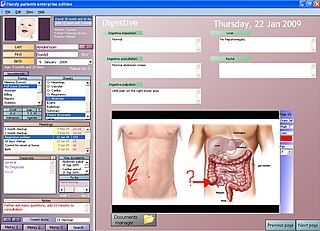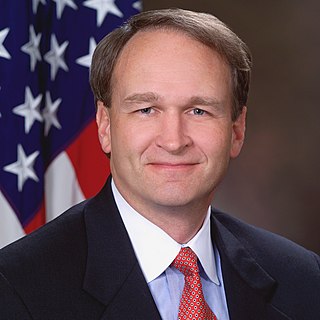In the United States, a health maintenance organization (HMO) is a medical insurance group that provides health services for a fixed annual fee. It is an organization that provides or arranges managed care for health insurance, self-funded health care benefit plans, individuals, and other entities, acting as a liaison with health care providers on a prepaid basis. The Health Maintenance Organization Act of 1973 required employers with 25 or more employees to offer federally certified HMO options if the employer offers traditional healthcare options. Unlike traditional indemnity insurance, an HMO covers care rendered by those doctors and other professionals who have agreed by contract to treat patients in accordance with the HMO's guidelines and restrictions in exchange for a steady stream of customers. HMOs cover emergency care regardless of the health care provider's contracted status.

Medical ethics is a system of moral principles that apply values to the practice of clinical medicine and in scientific research. Medical ethics is based on a set of values that professionals can refer to in the case of any confusion or conflict. These values include the respect for autonomy, non-maleficence, beneficence, and justice. Such tenets may allow doctors, care providers, and families to create a treatment plan and work towards the same common goal. It is important to note that these four values are not ranked in order of importance or relevance and that they all encompass values pertaining to medical ethics. However, a conflict may arise leading to the need for hierarchy in an ethical system, such that some moral elements overrule others with the purpose of applying the best moral judgement to a difficult medical situation.

Health care or healthcare is the maintenance or improvement of health via the prevention, diagnosis, and treatment of disease, illness, injury, and other physical and mental impairments in people. Health care is delivered by health professionals in allied health fields. Physicians and physician associates are a part of these health professionals. Dentistry, midwifery, nursing, medicine, optometry, audiology, pharmacy, psychology, occupational therapy, physical therapy and other health professions are all part of health care. It includes work done in providing primary care, secondary care, and tertiary care, as well as in public health.

The American Medical Association (AMA), founded in 1847 and incorporated in 1897, is the largest association of physicians—both MDs and DOs—and medical students in the United States.
Kaiser Permanente is an American integrated managed care consortium, based in Oakland, California, United States, founded in 1945 by industrialist Henry J. Kaiser and physician Sidney Garfield. Kaiser Permanente is made up of three distinct but interdependent groups of entities: the Kaiser Foundation Health Plan, Inc. (KFHP) and its regional operating subsidiaries; Kaiser Foundation Hospitals; and the regional Permanente Medical Groups. As of 2017, Kaiser Permanente operates in eight states and the District of Columbia, and is the largest managed care organization in the United States.

Primary care is the day-to-day healthcare given by a health care provider. Typically this provider acts as the first contact and principal point of continuing care for patients within a healthcare system, and coordinates other specialist care that the patient may need. Patients commonly receive primary care from professionals such as a primary care physician, a nurse practitioner, or a physician assistant. In some localities, such a professional may be a registered nurse, a pharmacist, a clinical officer, or a Ayurvedic or other traditional medicine professional. Depending on the nature of the health condition, patients may then be referred for secondary or tertiary care.
Medical malpractice is professional negligence by act or omission by a health care provider in which the treatment provided falls below the accepted standard of practice in the medical community and causes injury or death to the patient, with most cases involving medical error. Claims of medical malpractice, when pursued in US courts, are processed as civil torts. Sometimes an act of medical malpractice will also constitute a criminal act, as in the case of the death of Michael Jackson.
Against medical advice (AMA), sometimes known as discharge against medical advice (DAMA), is a term used in health care institutions when a patient leaves a hospital against the advice of their doctor. While leaving before a medically specified endpoint may not promote the patient's health above their other values, there is widespread ethical and legal consensus that competent patients are entitled to decline recommended treatment.
The Bureau of Primary Health Care is a part of the Health Resources and Services Administration (HRSA), of the United States Department of Health and Human Services. HRSA helps fund, staff and support a national network of health clinics for people who otherwise would have little or no access to care.

An electronic health record (EHR), or electronic medical record (EMR), is the systematized collection of patient and population electronically-stored health information in a digital format. These records can be shared across different health care settings. Records are shared through network-connected, enterprise-wide information systems or other information networks and exchanges. EHRs may include a range of data, including demographics, medical history, medication and allergies, immunization status, laboratory test results, radiology images, vital signs, personal statistics like age and weight, and billing information.
The term managed care or managed healthcare is used in the United States to describe a group of activities ostensibly intended to reduce the cost of providing for profit health care and providing health insurance while improving the quality of that care. It has become the essentially exclusive system of delivering and receiving American health care since its implementation in the early 1980s, and has been largely unaffected by the Affordable Care Act of 2010.
...intended to reduce unnecessary health care costs through a variety of mechanisms, including: economic incentives for physicians and patients to select less costly forms of care; programs for reviewing the medical necessity of specific services; increased beneficiary cost sharing; controls on inpatient admissions and lengths of stay; the establishment of cost-sharing incentives for outpatient surgery; selective contracting with health care providers; and the intensive management of high-cost health care cases. The programs may be provided in a variety of settings, such as Health Maintenance Organizations and Preferred Provider Organizations.

William Winkenwerder Jr. is a physician and prominent American health care industry leader. Most recently he served as CEO at Highmark, one of the country’s largest diversified health insurance companies, and as Assistant Secretary of Defense for Health Affairs. He also has served in other executive positions within the health industry, including as founder of a health care strategy consulting firm focused on transformative change and innovative health care technologies.
Defensive medicine, also called defensive medical decision making, refers to the practice of recommending a diagnostic test or medical treatment that is not necessarily the best option for the patient, but an option that mainly serves the function to protect the physician against the patient as potential plaintiff. Defensive medicine is a reaction to the rising costs of malpractice insurance premiums and patients’ biases on suing for missed or delayed diagnosis or treatment but not for being overdiagnosed. U.S. physicians are at highest risk of being sued, and overtreatment is common. The number of lawsuits against physicians in the USA has increased within the last decades and has had a substantial impact on the behavior of physicians and medical practice. Physicians order tests and avoid treating high-risk patients to reduce their exposure to lawsuits, or are forced to discontinue practicing because of overly high insurance premiums. This behavior has become known as defensive medicine, "a deviation from sound medical practice that is indicated primarily by a threat of liability".
The medical home, also known as the patient-centered medical home (PCMH), is a team-based health care delivery model led by a health care provider to provide comprehensive and continuous medical care to patients with a goal to obtain maximal health outcomes. It is described in the "Joint Principles" as "an approach to providing comprehensive primary care for children, youth and adults."
The California Medical Association (CMA) is a professional organization representing more than 43,000 physicians in the state of California. The organization was founded in 1856 and is a constituent organization of the American Medical Association.
The French health care system is one of universal health care largely financed by government national health insurance. In its 2000 assessment of world health care systems, the World Health Organization found that France provided the "close to best overall health care" in the world. In 2011, France spent 11.6% of GDP on health care, or US$4,086 per capita, a figure much higher than the average spent by countries in Europe but less than in the US. Approximately 77% of health expenditures are covered by government funded agencies.
An Accountable Care Organization (ACO) is a healthcare organization that ties payments to quality metrics and the cost of care. ACOs in the United States are formed from a group of coordinated health-care practitioners. They use alternative payment models, normally, capitation. The organization is accountable to patients and third-party payers for the quality, appropriateness and efficiency of its services. According to the Centers for Medicare and Medicaid Services, an ACO is "an organization of health care practitioners that agrees to be accountable for the quality, cost, and overall care of Medicare beneficiaries who are enrolled in the traditional fee-for-service program who are assigned to it".

Steward Health Care is the largest physician-led, private, tax-paying health care network in the U.S. — annually caring for 2.2 million people during more than 12 million physician and hospital visits. Headquartered in Dallas, Steward’s integrated health care model employs 40,000 people at 36 hospitals and hundreds of urgent care, skilled nursing, and primary and specialty care medical practice locations across 11 states and the country of Malta. Steward Health Care is led by CEO Ralph de la Torre, MD, a Cuban-American physician, engineer and cardiac surgeon.

Referalink Network, LLC is an American Cloud based services company headquartered in Atlanta, Georgia, USA. The company provides a referral, patient and report tracking system for ambulatory providers. Referalink's network tracks referrals from origin, patient compliance status, administrative and clinical details. For providers following the Patient Centered Medical Home model and the quality standards published by the National Committee for Quality Assurance Referalink provides a solution for Element 7A: Referral tracking.
Health care quality is a level of value provided by any health care resource, as determined by some measurement. As with quality in other fields, it is an assessment of whether something is good enough and whether it is suitable for its purpose. The goal of health care is to provide medical resources of high quality to all who need them; that is, to ensure good quality of life, to cure illnesses when possible, to extend life expectancy, and so on. Researchers use a variety of quality measures to attempt to determine health care quality, including counts of a therapy's reduction or lessening of diseases identified by medical diagnosis, a decrease in the number of risk factors which people have following preventive care, or a survey of health indicators in a population who are accessing certain kinds of care.








